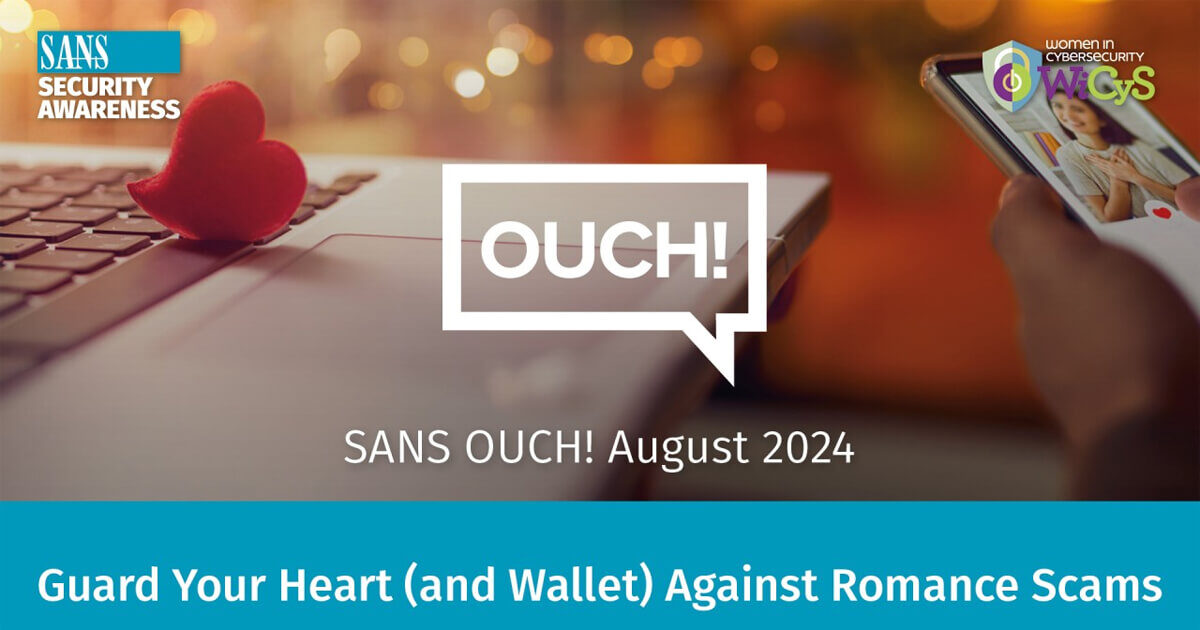Protect Your Heart (and Wallet) Against Romance Scams
August 6, 2024 •Temi Adetula, VP of WiCys ON Canada

Sarah was a kind, intelligent accountant nearing retirement. Widowed for several years, she felt a pang of loneliness that online dating profiles promised to soothe. Scrolling through pictures, she stumbled upon David, a charming architect supposedly working abroad. Their messages blossomed into daily conversations. David showered Sarah with compliments, his words painting a picture of a soulmate yearning for connection. Weeks turned into months, filled with virtual dates and shared dreams. Sarah, swept off her feet, readily confided in David about her dreams and finances, including a nest egg she'd meticulously saved for retirement.
Then came the "hardship." David, claiming a stolen passport while on a business trip, desperately needed money for a replacement. Blinded by love and trust, Sarah, despite initial hesitation, wired him a significant sum. This became a recurring pattern: fabricated emergencies or business opportunities followed by a financial plea. Trusting David completely, Sarah emptied her savings, even taking out loans, convinced she was helping the man she loved. Reality struck when David, after one final, exorbitant request, vanished completely. Devastated and heartbroken, Sarah not only faced financial ruin but the crushing betrayal of a love that never existed.
What Are Romance Scams?
Romance scams are a cruel form of deception where criminals exploit the desire for love and connection while gaining the affection and trust of the victim. They craft online personas, often using stolen pictures and profiles, to build a facade of affection. Their goal? To manipulate victims into parting with money or sensitive information. Preying on emotions, they create a strong bond, making it easier to exploit people. The emotional investment makes it harder for victims to recognize or admit the scam, leading to devastating financial and personal consequences.
The two most common ways scammers find their victims is by creating a fake persona to meet people on dating apps or randomly texting people and starting conversations. Have you ever received an odd text message simply saying "Hi" or looking like a wrong message to the wrong person? These are romance scammers trying to start up conversations with lonely people.
Spotting and Stopping Romance Scams
- Too Good to Be True: If someone seems like the perfect match quickly and the relationship progresses rapidly, it might be a red flag. Scammers often create ideal profiles to lure in victims.
- Love at Lightning Speed: Scammers express deep feelings and propose a serious commitment very early into the interaction to catch their victims off guard. Genuine connections take time to develop. Beware of whirlwind romances and professions of love that seem unrealistic.
- Never Able to Meet: Often citing living overseas or being in the military, scammers usually have elaborate excuses for why they cannot meet in person.
- Requests for Money: A telltale sign of a romance scam is when the person you are communicating with asks for money, especially under the pretext of emergencies, travel expenses, medical bills, or visas. Never send money or financial information to someone you haven't met in person.
- Avoidance of Video Calls: Scammers usually avoid video calls or repeatedly cancel virtual meetings at the last minute. They might use fake or stolen photos and want to avoid being identified.
- Secrecy and Isolation: The scammer may attempt to isolate you from friends and family or discourage you from discussing the details of the relationship, fearing that others might offer warnings against the scam. Don't be afraid to confide in loved ones about your online relationship. Their objective viewpoint can be invaluable.
- Changes in Communication Style: If you notice inconsistencies in grammar, spelling, or story details that don't seem to align with previous communications, it could be multiple scammers operating the same profile.
Romance scams lead to significant emotional and financial damage, making them one of the most harmful scams. Be careful with your personal information and finances in any relationship, especially one that starts online. If you ever feel pressured to send money or share financial details, it's a strong signal that something could be wrong. Remember, it's not just about protecting your finances, and personal information but also guarding your heart.
Guest Editor
Temi Adetula is the Vice President of WiCys ON Canada and a Technical Program Manager in the Cybersecurity space with over 20+ years of IT/Security experience with Fortune 500, Big 4 Corporations across financial and professional services. She is part of various inclusion and diversity communities and is an avid advocate of women in technology. Temi holds a BS in Computer Science & IT and a M.Eng in Information System Security.
The views, information, or opinions expressed in this article are solely those of the author and do not necessarily represent the views of Citizens State Bank and its affiliates, and Citizens State Bank is not responsible for and does not verify the accuracy of any information contained in this article or items hyperlinked within. This is for informational purposes and is no way intended to provide legal advice.
